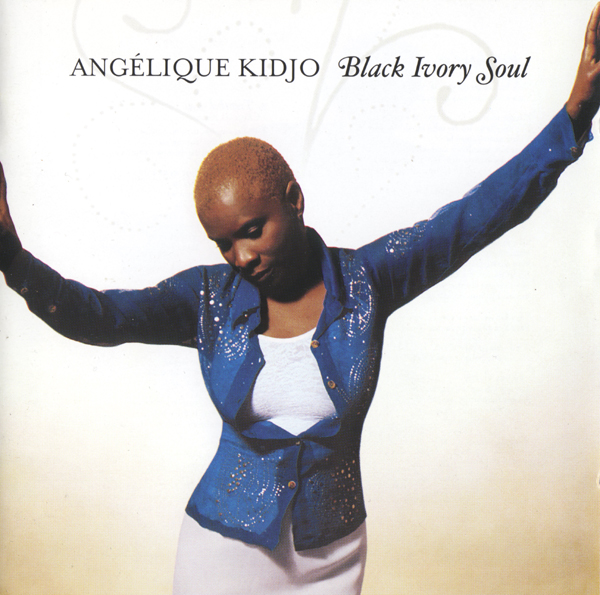ANGELIQUE KIDJO


1/ Refavela (Gil) 4.16
2/ Tumba (Kidjo,Brown) 3.49
3/ Les Enfants Perdus (Veneruso) 3.13
4/ Bahia (Kidjo,Hebrail) 3.33
5/ Ne Cedez Jamais (Albert,Kocurek) 3.54
6/ Iemanja (Kidjo,Brown) 4.26
7/ Afirika (Kidjo,Hebrail) 4.15
8/ Olofoofo (Kidjo,Cantuaria) 4.13
9/ Ces Petis Riens (Gainsbourg) 2.15
10/ Black Ivory Soul (Kidjo,Hebrail,Faragher) 4.36
11/ Ominira (Kidjo,Cantuaria) 4.22
12/ Okan Bale (Kidjo,Brown) 3.34
13/ Iwoya (Kidjo,Hebrial,Matthews) 3.47
14/ Mondjuba (Kidjo,Hebrail) 3.01
15/ Les Enfants Perdus (Single Version) (Veneruso) 3.42
Recorded at Sear Sound, New York City
Additional recording at the Magic Shop, NYC and Obatala Studio, Brooklyn
Bahianese percussion recorded at Cantate Da Cidade, Salvador de Bahia,
Brazil
Created at Orange Music, West Orange, New Jersey
Engineer at Sear Sound : Clark Germaine
Additional engineering by Dave Darlington
Assistant Engineer: Aaron Franz
Engineering and Protools editing at the Magic Shop and Obatala: Cyrille
Taillandier and Jean Hebrail
Engineer at Orange Music: Robert Musso
Assistant Engineer: James Dellatacoma
Protools transfers: DXT
Reproduction and mix translation: Bill Laswell
Mastered by Greg Calbi at Sterling Sound, New York City
Angelique Kidjo: lead vocals, background vocals; Dave Mattews (2): vocals; Brenda White-King, Cindy Mizelle,
Dennis Collins and Curtis King (5,8): additional background vocals; Joao Mota and Dominic Kanza: electric
guitar; Romero Lubambo: nylon string guitar; Vinicius Cantuaria (3): acoustic guitar; Rubens De La Corte
(1): acoustic guitar; Bernie Worrell: organ, Fender Rhodes; Mahamadou Diabate: kora; Michel Alibo: electric
bass; Ira Cohen: acoustic bass; Gilmar Iglesias Gomes: Brazilian percussion; Abdou Mboup and Aiyb Dieng:
African percussion; Ahmir "?uestlove" Thompson: drums; MATERIAL STRINGS - Juliann Klopotic and Cathy Yang:
violin; Kathy Sinsabaugh: viola; Tara Chambers: cello.
Music arranged by Angelique Kidjo and Jean Hebrail
Material Strings arranged and conducted by Karl Berger
2002 - Columbia Records/Sony (Europe), 506069 2 (CD)
2002 - Columbia Records/Sony (USA), CK 85799 (CD)
Note: Tracks 3, 5 and 15 are not on the US version, and the track order differs on the two versions.
Tom Terrell, CDNOW contributing writer (courtesy of CDNow)
All Music Guide Angelique Kidjo's records have brought her plenty of acclaim, but they've tended to be very mixed -- some tracks exceptional, others remarkably ordinary. Black Ivory Soul, her exploration of the connection between her native Benin and the Bahian region in the north east of Brazil, might just be her most consistent and satisfying effort to date. She's toned down the R&B influence that peppered 1998's Oremi -- indeed, only the title cut is R&B, and that has a sweet Brazilian inflection -- and focuses instead on the job at hand. Working with talents like Carlinhos Brown and Vinicius Cantaria has obviously helped; "Tumba," for example, fairly crackles with crisp axé rhythms that drive the song along, while"Ominira" and "Afrika" makes the distance between the two continents seem very small indeed. Kidjo gets rootsier here than she has in a long time, as on her version of Gilberto Gil's "Refavela," which offers an unvarnished look -- lyrically and musically -- at the ghetto, or the more introspective "Okanbale," where the rippling kora lines falling like water through the song. Kidjo uses her trademark lush harmonies throughout the album, and she's in great voice, even content to play second fiddle to Dave Matthews on "Iwoya," where the status of the guest star (and the English language vocal) seem like a calculated move to push one of the disc's weakest tracks straight to AAA airplay. But, happily, that's the exception, not the rule; on the whole this record's heart is in art, not commerce, even tossing in a spare, loving cover of Serge Gainsbourg's "Ces Petits Riens" to close things out, although it's quite out of place on the record. This time around, Kidjo seems to have followed her muse, not the money, and the results are, virtually, everything she's always promised to do, but never quite achieved before.
Chris Nickson (courtesy of The All Music Guide by way of the Get Music website)